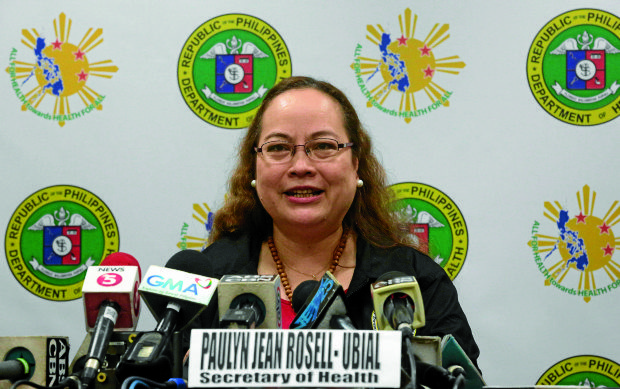
Health Secretary Paulyn Jean Rosell-Ubial
INQUIRER FILE PHOTO / GRIG C. MONTEGRANDE
The cut to the operating budgets of 49 public hospitals is “beyond the control of the Department of Health,” Secretary Paulyn Jean Ubial told lawmakers on Monday.
Ubial said it was the Department of Budget and Management’s decision to slash the overall maintenance and other operating expenses (MOOE) of regional and special hospitals by P1.49 billion, or 28.45 percent.
During the House of Representatives’ appropriations committee hearing on the DoH’s budget, Ubial said the DBM cited the utilization rates in 2016 in drafting the proposed budget for the 2018.
“Unfortunately, it is beyond the control of DOH… DBM used the actual obligations of 2016 to provide the 2018 level of allocations,” she said, adding that the agency rejected the DOH’s proposed budget attuned to the actual occupancy rates of the hospitals.
But, she said there are already marching orders for hospitals to maximize their spending capacity to address the DBM’s concern with the utilization of their budgets.
“When we spend, it translates to service to individual patients,” she said.
Bayan Muna Party-list Rep. Carlos Isagani Zarate raised the said issue during the hearing and called for the budget for the operating expenses of hospitals to be increased.
READ: Zarate blasts Ubial over P1.4-B budget cut to 49 hospitals
“Where is the concern for the poor?” Zarate exclaimed. “The funds cut by the DBM should be restored again. We see here where the priorities of DBM really lie. They claim to care for the poor, but they cut the budget of hospitals.”
Gabriela Women’s Party Rep. Arlene Brosas said the proposed MOOE reduction is “not in accordance” with President Duterte’s vow to grant “equitable access to quality and affordable health services” in his recent State of the Nation Address.
Of the country’s 66 regional and special hospitals, the DBM proposed cuts to the MOOE of 49 such institutions. Hospitals with large cuts include the Southern Philippines Medical Center (71.9 percent), Bicol Sanitarium (57.41 percent), Research Institute for Tropical Medicine (56.63 percent), Davao Regional Hospital (54.64 percent), and Amai Pakpak Medical Center in the devastated Marawi City (51.76 percent).
Meanwhile, Brosas and ACT Teachers Party-list Rep. Antonio Tinio questioned the reduction of the budget for the elimination of diseases such as malaria and worm diseases such as filariasis and schistosomiasis.
For this one, Ubial explained the budget only appeared to have decreased because the “soft components” of various programs were transferred and lumped together under the heading of “public health management.”
Public health management, which concerns the training of personnel and monitoring of programs, is set to increase to P4.15 billion, from the current year’s P2.5 billion.
Ubial denied this was a lump-sum allocation, because the components were itemized under a “work and financial plan.” She explained the DBM directed the consolidation of such “soft components” so there would be uniformity in the training of personnel and monitoring of various programs.
Meanwhile, the “hard components” of drugs, medicine and equipment were retained in their original programs.
“All the commodities in the budget… stayed the same. We did not reduce the [funds for] medicine,” Ubial said. “Nothing was deducted, that we can assure you.” JE